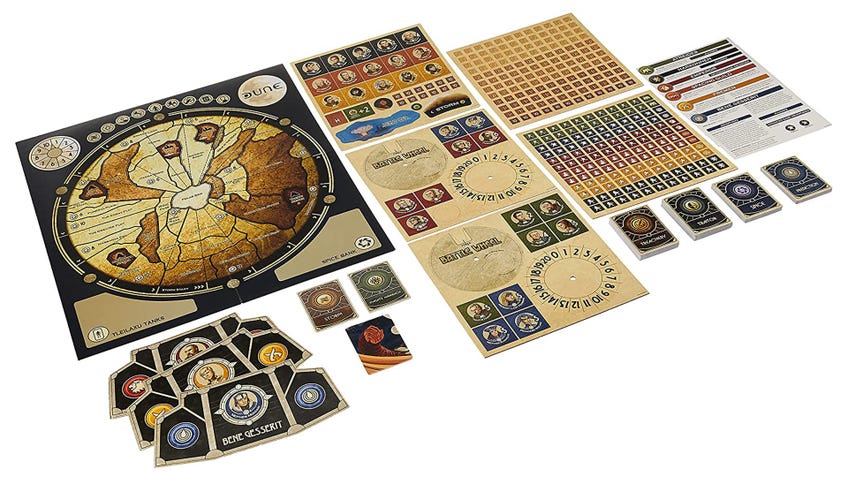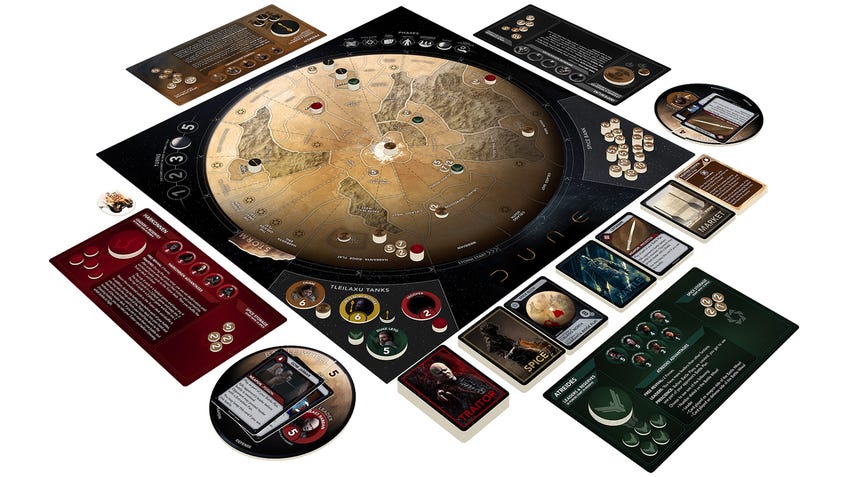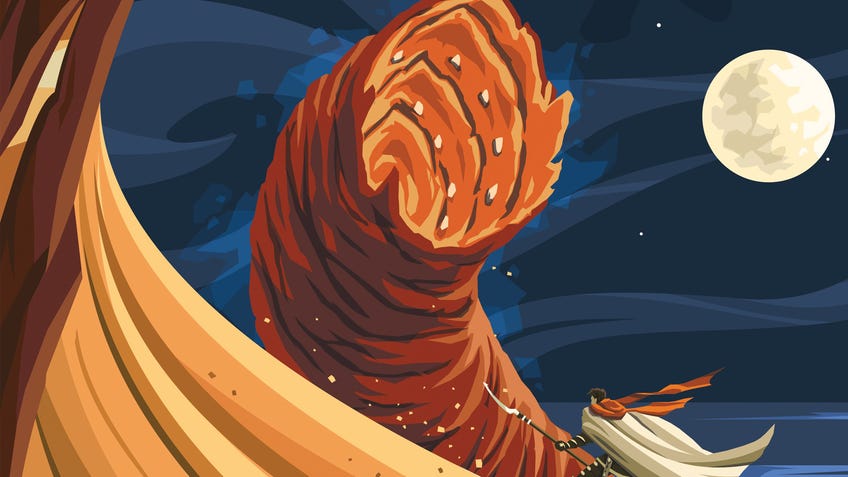Before Denis Villeneuve’s Dune movies, the sci-fi epic’s best adaptation was a board game no-one could buy for decades
The groundbreaking Dune board game changed everything - and then vanished.
Like sand on Arrakis, Dune is everywhere. In the wake of Dune: Part Two hitting cinema screens at the start of the month, it seems that everyone and their questionable bald nephews are Dune their part in sharing sandworm memes, recognising the signs of their own Lisan al Gaib, reading Josh Brolin’s poetry and recognising Rebecca Ferguson as the holy mother figure she’s always been. (The less said about their relationship to the Dune popcorn bucket, the better.)
It seems largely agreed that director Denis Villeneuve has created a modern cinematic classic in his two-part (so far) adaptation of Frank Herbert’s dense novel, reversing Dune’s big-screen fortunes after David Lynch’s troubled box-office bomb in the eighties and the legendarily unrealised vision of cult cinema figure Alejandro Jodorowsky to enlist Pink Floyd, Mœbius and Salvador Dalí (to name but a few of the absolutely wild who’s-who cast and crew) a decade earlier.
While Dune: Part Two and its predecessor are undoubtedly the most acclaimed adaptations of Dune seen on screen yet (I’ll openly admit to having not seen the Syfy miniseries broadcast in 2000), an equally masterful and groundbreaking adaptation of Herbert’s sci-fi universe beat them to the punch by decades - albeit in a completely different medium. There’s a good chance you might’ve missed it, though, as it then spent over 30 years impossible to find.
The Dune board game was first released in 1979, right in the middle of what would become Frank Herbert’s original six-book series. (His son, Brian, would later add many, many more spin-offs and sequels to that number.) Responsible for turning Herbert’s complex mixture of religion, politics and science-fiction into an interactive experience was an all-star team: designers Peter Olotka, Jack Kittredge and Bill Eberle, working collectively under the name of Future Pastimes, who had changed what board games were capable of two years earlier with the seminal Cosmic Encounter. After convincing board game powerhouse and then-licence holder for a Dune tabletop game Avalon Hill to let them have a stab at an adaptation - helped by the studio’s unimpressed response to the proposed by another group of designers - the team got to work.
The Dune board game was a highly faithful and appropriately visionary approach to capturing the spirit of Herbert’s rich universe and complicated characters in a cardboard box.
Like Cosmic Encounter’s wild alien species - a reaction to the static player roles seen in classics like Risk and Diplomacy - the Dune board game handed each player a slightly different set of rules and powers, encapsulating the different ways in which the Atreides, Fremen, Harkonnen and more sought to control the planet of Arrakis. The Fremen could harness the power of the Shai-Hulud to move quickly and threaten their foes, while the Harkonnen were able to exert their treacherous nature over others and the Atreides could use Paul’s prescience to see into the future by looking at cards and the hidden dials used to simultaneously resolve combat. (The revolutionary dials were repurposed from an unreleased Future Pastimes design, the Roman Empire-set Tribute.) Most infamously, the manipulative, mind-controlling Bene Gesserit could predict another player to win - and steal the victory at the last second if they were right.
Those unique abilities led to an exciting, ever-shifting relationship between players, who could form and break alliances throughout each game to pursue victory together - or swap sides as it suited their own advantage. Combined with the game’s simulation of Arrakis’ harsh desert storms, the terrifying presence of sandworms who might suddenly appear, the value of precious spice melange and more, the Dune board game was a highly faithful and appropriately visionary approach to capturing the spirit of Herbert’s rich universe and complicated characters in a cardboard box.

The board game’s acclaimed success was short-lived. A re-release in 1984 alongside David Lynch’s Sting-starring movie - the game itself had a legally distinct illustration of Feyd-Rautha on the box due to likeness rights - brought with it two new expansions, Spice Harvest and The Duel, with the idea of adding new content in separate boxes being itself innovative for the time. When the film was met with negative reviews and lost money on its $40m budget, however, the board game was caught in the radius of the box-office bomb.
After Frank Herbert died in early 1986, the licensing rights to Dune were absorbed into his estate and wouldn’t emerge for another 30-plus years - a decision that the game’s designers believe was due to the film’s failure and Herbert no longer being around in person. The only Dune tabletop releases for the next three decades would be two small variants published as magazine promos (the last in 1990) and a French-language reprint of the game in 1993.
Despite apparent efforts by Hasbro - which had acquired Avalon Hill in 1998 - to regain the rights, the Dune board game gathered dust for decades. After the rights to the board game’s mechanisms reverted to its designers, they worked with Fantasy Flight Games to apply a revised reimagining of the dial-based battles and unique faction powers to the universe of Twilight Imperium in 2012’s Rex: Final Days of an Empire. Fantasy Flight had previously republished Cosmic Encounter, and asked about Dune - only to find that the licence was impossible to secure, leading it to use its own sci-fi setting instead.
Its very first board game adaptation remains arguably the ultimate tabletop Dune experience.
In the meantime, players took the future of the Dune board game into their own hands, creating their own fan-made editions released as free print-and-play materials (with legally-available artwork) for others to make at home. Other fans even created brand new games inspired by Dune’s innovative gameplay, repurposing it in everything from dice-based spin-offs to quicker 'Express' variants.
Shortly after it was revealed that Villeneuve was working on a new Dune film, tabletop studio Gale Force Nine announced that it would bring back the original Dune board game, 35 years after it was last released in English - and decades after any official version had been available. As well as reuniting the original designers to polish its rules, the publisher enlisted the help of noted artist and designer Ilya Baranovsky, who had risen to prominence with a stunning fan-made remake known as the ‘Ilya Edition’, to make the redesigned map and revamped visuals official.

The board game’s release in 2019 seemingly opened the floodgates for tabletop Dune games after decades of drought, being swiftly followed by several expansions, beginner-friendly spin-off Dune: A Game of Conquest & Diplomacy, and brand new adaptations such as Arrakis: Dawn of the Fremen, based on the gameplay of Olotka, Eberle and Kittredge’s post-Dune game Borderlands from 1982.
Dune has since expanded further into the realm of tabletop RPGs with British studio Modiphius' Dune: Adventures in the Imperium, yet its very first board game adaptation remains arguably the ultimate tabletop Dune experience - and has never been easier to find for old fans and newcomers alike after decades of obscurity.
Villeneuve’s films are rightfully garnering acclaim and attention as masterful adaptations of Herbert’s magnum opus, but the Dune board game shouldn’t be lost in their shadow. If any Dune adaptation has earned its place in the Arrakeen sun, it’s this one.


